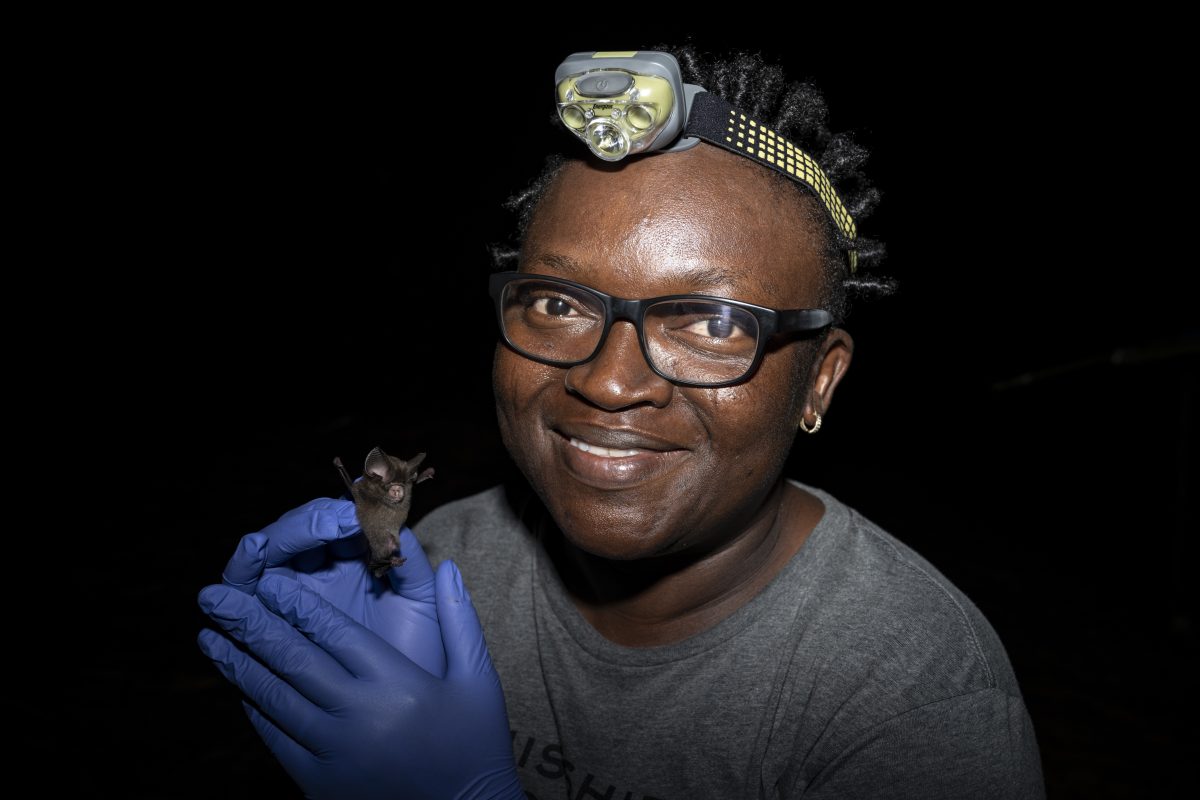
Q&A with Iroro Tanshi, 2023 Pritzker Genius Award winner
She does whatever it takes, from leading the Small Mammal Conservation Organization to creating the region’s first research-informed wildfire prevention program. Her goal is to make sure the unique ecosystems…
Iroro Tanshi won the 2023 Pritzker Emerging Environmental Genius Award for her comprehensive efforts to conserve the last pristine forests in West Africa.
She does whatever it takes, from leading the Small Mammal Conservation Organization to creating the region’s first research-informed wildfire prevention program. Her goal is to make sure the unique ecosystems of these forests survive despite pressure from climate change and human activities like unsustainable farming.
Tanshi will join UCLA as we announce this year’s Pritzker Award winner at a ceremony on Oct. 30. We recently spoke with her about the many things she’s been doing since winning the award.
What exciting things have you been up to since we saw you last October?
Iroro Tanshi: We’ve been consolidating our wildfire program on the ground and reaching out to partners in the hopes of setting up a regional effort. We set up a field station in collaboration with the government that also serves as a fire command center — coordinating conservation and field research with our wildfire prevention efforts.
I’m also currently a postdoctoral researcher at University of Washington, and that work is about doing research on bat communities in Nigeria and the Gulf of Guinea islands. We’re looking at differences in bat communities in forests that are relatively stable versus those that have experienced a lot of change due to wildfires and agriculture.
I’m glad to see you’re getting back to bats.
Everybody knows me for the conservation stuff — they don’t realize that bats were my first love, and something I’m still very interested in.
While researching, you’re somehow also running a fast-growing organization in Nigeria. What’s been happening on the ground there over this year, with wildfire, conservation and everything else?
You’re right our team (Small Mammal Conservation) has grown to nearly 100 people, up from 75 last year. We’re working harder than ever. But fire remains a huge threat to Afi Mountain Wildlife Sanctuary, one of only two protected, original forest that remains in Nigeria, and the threat has significantly increased due to a large increase in smallholder farming. Nigeria is experiencing a deep recession, and everyone is trying to cash in on cocoa, which is booming on the international market. The value of the crop has gone up almost 500% (fake boom due to exchange rates) in some cases.
That means more land clearing to plant cocoa, which increases the surface area that dries faster and decreases the amount of moisture that would help hold back fires. People are going into the buffer zone forests using fire and chainsaws to clear land. Some of them are encroaching on protected land.
How are you responding to these changing threats?
Thanks to our strong local partnerships, we had no fire this past season, so we expanded the fire prevention program by improving conditions for fire rangers — getting them motorcycles, fireproof boots and creating more vehicle access to get to hard-to-reach locations. What we really want to do get boots in faster to decrease response time.
What I’m really happy about — and we’re still analyzing the data — is that it seems like we’re having a decline in the number of reported fires each year. Every fire we can prevent on farms, because we’re educating people, communicating risks and responding to fires, has significant implications for conservation.
What are you hoping to achieve in the future?
I want to find support to continue and expand our mentorship program for West African students. I also want to launch the fire command center we’re planning with the Cross River state government. That would allow us to coordinate better and really decrease the response time for fires. We’re also working to restore fire damaged habitat through a women program for restoration.
We still have the forest with 200- or 300-year-old trees. The area is poorly studied and treacherous to access. I’m keen to have infrastructure on the ground that will set people up to keep doing work in the area.
We also recently discovered another small population of the Endangered Short-tailed roundleaf bat in southern Cross River – a tiny forest patch about one square kilometer in size within a karst system that is surrounded by small holder annual agriculture, which is heavily fire prone. We’re now working with the communities and state government to protect this forest patch through agroforestry and fire management.
Published:


